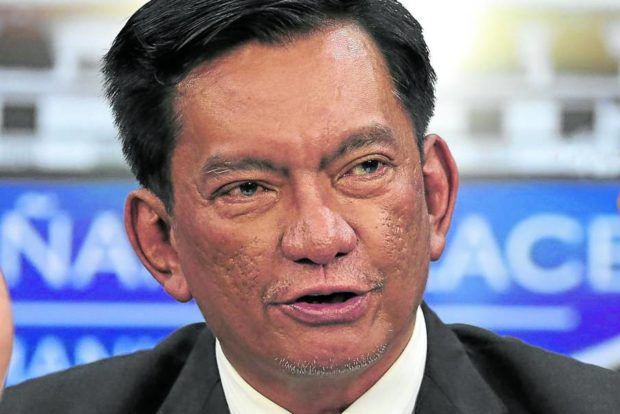BSP cap sought on digital transfer fees charged by banks
MANILA, Philippines — Albay Rep. Joey Salceda has called on the Bangko Sentral ng Pilipinas (BSP) to regulate the high fees charged by banks for digital fund transfers using Instapay, PesoNet, and other interbank systems.
Calling prevailing high bank transfer fees a form of “avarice,” or extreme greed for wealth or material gain, the House ways and means committee chair on Tuesday cited data from the BSP showing that interbank transfer fees using PesoNet reached as high as P2,100 per transaction, with P550 being the highest charged by a purely local bank, while InstaPay fees amounted to as much as P35 per transaction.
PesoNet is used for fund transfers involving bigger amounts, while InstaPay, which has a daily limit of P50,000, is commonly used by ordinary consumers for everyday transactions such as paying groceries or electricity and water bills involving as little as a few hundred pesos.
InstaPay and PesoNet are private entities operated by a consortium of financial institutions. InstaPay is operated by Bancnet and counts several BSP-supervised banks as its members. PesoNet is operated by the Philippine Clearing House Corp., with banks as members. Both entities are overseen by the Philippine Payments Management Inc., a stand-alone, self-governing regulatory structure ran by the banks themselves.
Salceda also criticized the transfer fees for transactions within the same bank, although many financial institutions do not charge their clients for intrabank fund transfers.
Article continues after this advertisementThere was no immediate reply from BSP when sought for comment on Tuesday.
Article continues after this advertisementExorbitant
“There are even charges for supposedly ‘unenrolled’ accounts, which to me is just fiction. What is the value added that the bank is charging for? Even money for pickup within the same bank can be charged as high as P100. Again, what is the value added that merits charging?” he asked.
Salceda went on: “There isn’t even a guarantee that these transfers are safe. Just a few months ago, we saw mass incidents of bank transfer fraud and interception.”
The BSP should cut these exorbitant bank transfer fees, Salceda pointed out.
“We are experiencing elevated inflation. Key policy rates have gone up as a result. Meanwhile, very few, if any, banks have raised their interest rates on deposits, to at least transfer some of the benefits to savers. And yet, bank transfer fees remain high for several banks. If this is not avarice, I don’t know what is. The BSP should cut it,” he said.
He called on the BSP to “issue regulations capping the charges,” as setting a cap on fees could force traditional banks to innovate and be more retail consumer-friendly just like virtual banks, which offer high deposit interest rates and very low to zero bank transfer fees.
“Look at the virtual banks. Very high depository interest rates of up to 6 percent (a year). No traditional bank matches this. Very low to zero fees, even interbank. If virtual banks are capable of offering the most retail-friendly services at very low fees, I don’t see why our biggest banks can’t,” Salceda said.
He added: “I think a cap would force them to innovate and force them to really offer loans and other financial services instead of milking the small client.”
Salceda noted that the biggest private banks “would still make profits even if all fees and commissions were reduced to absolutely zero.”
“I’m not saying they do that. I’m just saying keep fees low and reasonable. The larger the bank, it seems, the larger fees are as a share of total net income. Not capping fees sends a very bad signal and incentive to large banks: that they can make money off the average wage earner, without performing their crucial role as sources of capital for economic growth. All they need to do is keep raising fees,” he said.
Getting relaxed
The economist-turned-lawmaker warned that banks might be “starting to get too relaxed and are believing they can get away with such things as exorbitant fees.”
“Regulation will be good, but they will eventually find ways to circumvent regulation. Competition is much better, because then they will have to straighten up for survival,” Salceda said.
At the start of the pandemic in 2020, many financial institutions waived their InstaPay and PesoNet transfer fees as a relief measure for consumers battered by the economic downturn and forced to go digital by the stringent lockdowns imposed to control the spread of COVID-19. The BSP then extended the waiver of fees for fund transfers until the end of last year and imposed a moratorium on any increase in online bank fund transfer fees when the waiver lapsed starting January 2022.
The BSP has been enticing more people to adopt the technology and speed up the Philippines’ transition to a more cash-free economy.
However, the cost of going digital has gotten burdensome for many consumers as every transaction, even for a few hundred pesos, is charged a fee if one is dealing with different banks.
As the pandemic forced consumers to do more of their necessary household tasks through the convenience of the internet, lawmakers earlier called on banks to continue waiving the fund transfer fees.
RELATED STORIES
IN THE KNOW: Interbank ATM fees
Legarda seeks cuts in fees on remittances
BSP urged to name banks asking for higher ATM transaction fees
